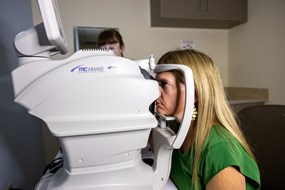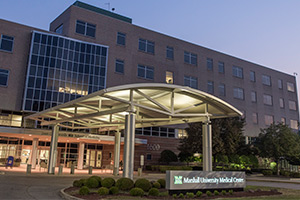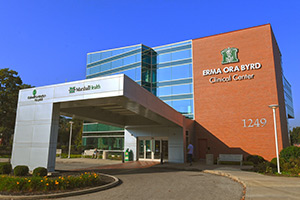Marshall Health uses the artificial intelligence (AI) system LumineticsCore™ to test patients with diabetes for diabetic retinopathy, a leading cause of blindness. Diabetic retinopathy can occur when high blood sugar levels cause damage to blood vessels in the retina, which is in the back of the eye.
Marshall Health partners with diabetic patients and their primary care providers to identify signs of eye disease and provide more opportunities for early intervention before vision loss occurs.
The LumineticsCore exam is typically completed in minutes. The pictures are then evaluated by the AI’s diagnostic software, which searches for signs of diabetic retinopathy. An immediate diagnostic report is produced at the point-of-care, allowing providers to discuss the results with the patient while they are in the office.
This exam does not replace a comprehensive eye exam by an eye care professional; however, it does provide a convenient option for patients with diabetes to proactively prevent vision loss during your regularly-scheduled visit with your primary care provider.
Medicare covers this exam annually for diabetic patients, subject to plan co-pays and deductibles.

Ask your primary care physician about testing your eyes during your next visit. Find where to get an exam here.
This service is made possible through a generous grant from The Huntington Foundation.
Anyone with diabetes, including type 1, type 2 and gestational, is at risk for eye diseases such as diabetic retinopathy. These diseases have no symptoms until the later stages. If left untreated, diabetic retinopathy can cause blindness. Eye experts recommend people with diabetes have their eyes tested each year to prevent vision loss.
Diabetic retinopathy, including macular edema, is a complication of diabetes, where blood vessels in the back of the eye are damaged by high blood sugar levels or there is fluid build up in the macula. Most people with diabetes will develop some form of eye disease related to diabetes at some point in their lifetime.
A negative diagnostic result means diabetic retinopathy was not detected and the patient does not need to see an eye care specialist at this time. If the patient is experiencing blurred vision or any other symptoms of vision loss, the patient should see an eye care specialist right away.
A positive diagnostic result means diabetic retinopathy was detected and the patient needs to see an eye care specialist for immediate care.
If the patient is experiencing blurred vision or any other symptoms of vision loss, the patient should see an eye care specialist right away.
Only an eye care specialist can diagnose whether the patient’s disease is severe enough to require treatment. This is why it is important to see an eye
care specialist right away.
A positive result is also an important reminder to talk to a doctor about eye care and ways to reduce the risk of diabetic retinopathy and the risk of possible vision loss.
In a small number of cases, the quality of the image captured may not be sufficient for LumineticsCore to analyze and produce a diagnosis. The patient should be referred to an eye care specialist for further examination in this case.

A provider-based department of Cabell Huntington Hospital
Marshall University Medical Center
1600 Medical Center Drive
1st Floor
Huntington, WV 25701
Phone: 304.691.1100

A provider-based department of Cabell Huntington Hospital
Erma Ora Byrd Clinical Center
1249 15th Street
2nd & 3rd Floor
Huntington, WV 25701
Phone: 304.691.1000